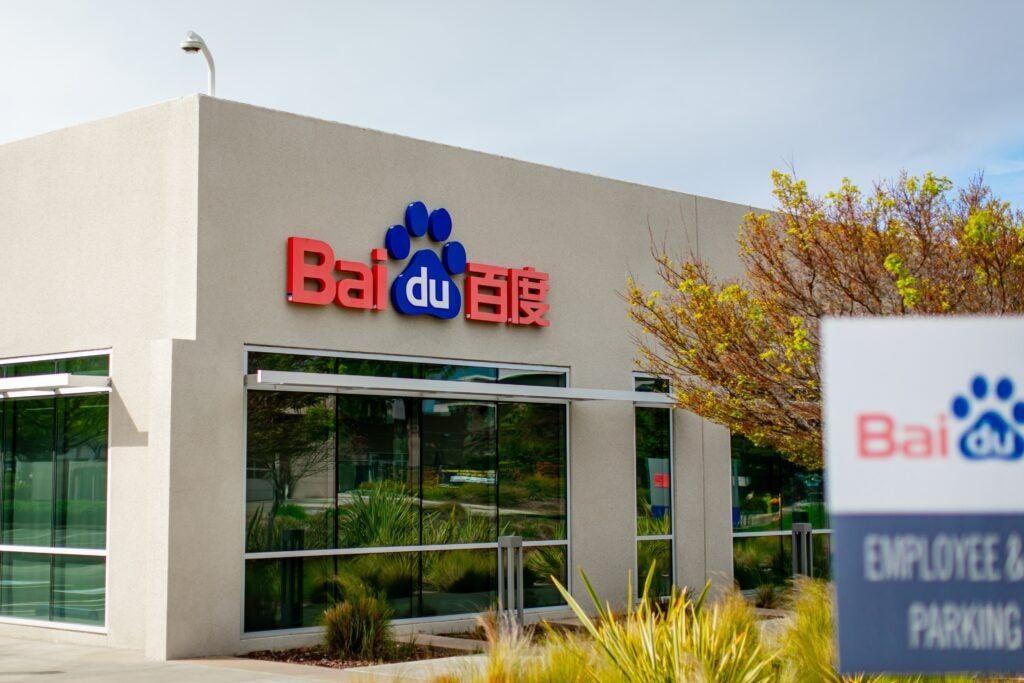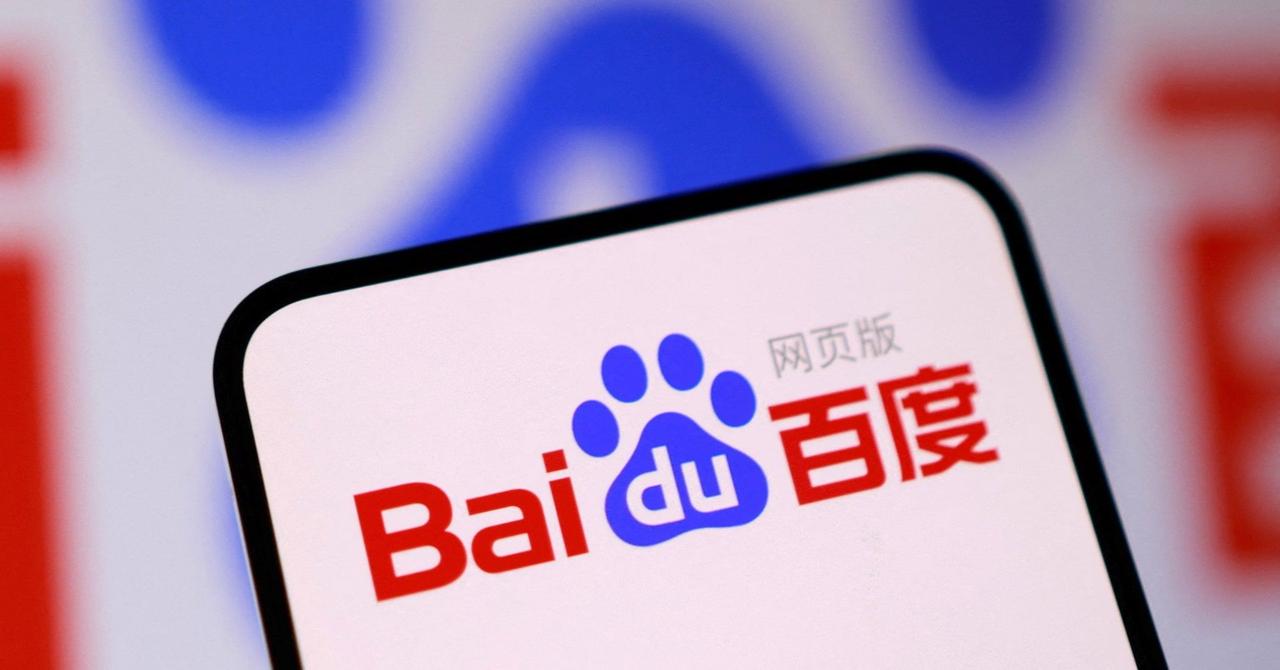Baidu's Q1 2025 Earnings: AI Cloud Soars Amid Challenges and Opportunities
7 Sources
7 Sources
[1]
Baidu's AI cloud soars, but the risks are stacking up
China's biggest AI player, Baidu (BIDU), beat expectations with a surge in cloud revenue, but its ad business is shrinking, it's slashing AI prices to stay ahead of local rivals, and fresh U.S. chip export issues could cut its momentum short. In Q1 earnings posted Wednesday, Baidu reported that its AI Cloud revenue jumped 42% year-over-year, and in tandem, net income soared 42% to $951 million. However, the beat was padded by nearly $618 million in investment revaluation gains, not just operational lift. But even as the company leaned hard into enterprise AI, its core ad business fell 6% vs. last year. That decline in online advertising revenue during Q1 2025 looks to be primarily attributed to macro factors, including slowing consumer spending in China. Observers following search volumes on both sides of the Pacific may wonder if Baidu's results recall Alphabet's recent panic when an Apple (AAPL) exec testified regarding reduced search volumes. While there's no direct evidence linking this decline to AI reducing search volumes, it's plausible that the integration of AI technologies, like Baidu's Ernie chatbots, could be altering user behavior. Such a shift could impact ad impressions and click-through rates, with knock-on effects for advertising revenue. However, Baidu has not explicitly stated that AI is the cause of the advertising revenue decline. Speaking of Ernie, Baidu also finds itself in an arms race at home -- and racing to undercut. Last month, the tech giant slashed prices on its Ernie 4.5 Turbo model by 80%, and cut pricing on its X1 Turbo model by half, in a bid to stay ahead of domestic competitors like Alibaba (BABA), DeepSeek, ByteDance, and Moonshot AI. Founder Robin Li told developers the company's focus is on "removing friction," that is, letting builders create without worrying about model cost or capabilities. It's a slightly different kind of AI boom than the one playing out in the U.S., where Microsoft's (MSFT) Azure grew 33%, Google Cloud 28%, and AWS 17%, with strong monetization and margin performance. Baidu is growing faster, arguably, but it appears to be doing so by sacrificing pricing power and eating capex, corporate moves that can quickly turn into a race to the bottom. It's not that American companies aren't also wary of capex and overall spending, however, with Microsoft recent layoff's suggested ongoing scrutiny of its costs. Complicating matters for Baidu: The U.S. Commerce Department's recent guidance warning against Huawei's Ascend AI chips has reignited geopolitical risk, if it ever died down at all. Chinese officials called the move "unilateral bullying," and Baidu -- reliant on domestic chip supply -- is caught in the crossfire. Baidu's ambitions aren't limited to China. The company's autonomous driving unit, Apollo Go, began operating its first robotaxis in Dubai this month -- part of a push to commercialize AI on a global scale and an understandable move given the massive AI opportunity in the middle east, which American tech companies are themselves racing to capitalize on, per Wedbush. Baidu's AI ambitions are real and, to an extent, already paying off. But they're unfolding in a market that's fragmented, subsidized, and shadowed by geopolitics. Cost-cutting is helping to improve results for now, with longer-term effects not yet clear. Calling the outlook "cloudy" seems fair.
[2]
China's Baidu posts rise in Q1 revenue as seeks to grow AI presence
Beijing (AFP) - Chinese internet giant Baidu on Wednesday posted a quarterly revenue increase of three percent, as the firm seeks to grow its presence in artificial intelligence and expand its robotaxi business abroad. The Beijing-based firm operates China's main search engine and has long been a key player in the domestic tech industry -- but faces stiff competition both from traditional rivals like Tencent and Alibaba and a host of newer upstarts. Baidu derives a large part of its revenue from advertising, a sector vulnerable to fluctuations in consumer sentiment, and has sought to diversify with cloud computing, self-driving cars and AI. The firm achieved revenue of 32.45 billion yuan ($4.5 billion) in the first quarter of 2025, up 3 percent year-on-year, according to an earnings report released Wednesday on the Hong Kong Stock Exchange website. Net income during the first quarter reached 7.72 billion yuan, up 42 percent year-on-year. China's consumer-facing AI sector attracted global attention after startup DeepSeek released a model that performed comparably to competitors such as US-made ChatGPT, apparently at a much lower developing cost. In March, Baidu announced the launch of its latest X1 reasoning model -- which the company claims performs similarly to DeepSeek's but for a lower cost -- and a new foundation model, Ernie 4.5. Baidu has also axed subscriptions for its AI chatbot Ernie Bot, making it free for individual users. "We are confident that our AI-first strategy positions us to remain at the forefront and to capture long-term growth opportunities in the AI era," said Robin Li, co-founder and CEO of Baidu, in the filing. "We also achieved a pivotal milestone in our robotaxi business, as Apollo Go expanded internationally," Li added. In March Baidu announced it had signed an agreement to launch autonomous driving tests and services in Dubai, Apollo Go's first international fleet deployment. The company also plans to start testing self-driving taxis in Europe by the end of this year, a source with knowledge of the matter confirmed to AFP earlier this month. The company will also start testing in Turkey, they said.
[3]
Baidu's Revenue Surge in Q1 FY25, AI Cloud and Autonomous Driving Thrive | AIM
Chinese tech giant Baidu reported its first-quarter 2025 results with a revenue of RMB 32.5 billion ($4.47 billion), a 3% increase year-on-year, driven by growth in its AI Cloud business and advancements in intelligent driving. The company's AI Cloud revenue surged 42% year-on-year. Its core revenue stood at RMB 25.5 billion ($3.51 billion). Baidu also expanded its autonomous ride-hailing service, Apollo Go, internationally by entering Dubai and Abu Dhabi and began open-road validation testing in Dubai in May 2025. "AI Cloud continued its robust growth in the first quarter, which provides solid support to our overall revenue while we accelerate the AI transformation across our mobile ecosystem," said Junjie He, interim CFO of Baidu. Meanwhile, co-founder and CEO Robin Li expressed confidence in their AI-first strategy and said they are positioned to remain at the forefront and to capture long-term growth opportunities in the AI era. Apollo Go provided over 1.4 million rides in the first quarter, a 75% increase year over year, and has cumulatively completed more than 11 million rides as of May 2025. The service also secured permission for open-road testing with passengers in Hong Kong and formed a strategic partnership with China's CAR Inc. to launch fully autonomous vehicle rentals. Baidu launched upgraded AI models, including ERNIE 4.5 with multimodal capabilities and ERNIE X1 reasoning model, along with improved versions released in April at lower prices. The company also updated its MaaS platform and deep learning framework PaddlePaddle, supporting AI-native application development. The company's net income attributable to Baidu rose 42% to RMB 7.7 billion ($1.06 billion). Baidu's investment in AI is reflected in increased costs, with a rise in AI Cloud-related expenses and traffic acquisition. After its Q4 FY24 results, the company also appreciated Hangzhou-based High-Flyer-owned DeepSeek's open-source approach that had accelerated AI adoption. "One thing we learned from DeepSeek is that open-sourcing the best models can greatly help adoption. When the model is open source, people naturally want to try it out of curiosity, which helps drive broader adoption," Li had said. Baidu continues to strengthen its AI portfolio, holding the most significant number of AI-related patents in China. The company plans to maintain its AI-driven growth while scaling intelligent driving services globally.
[4]
China's Baidu posts rise in Q1 revenue as seeks to grow AI presence
Chinese internet giant Baidu on Wednesday posted a quarterly revenue increase of 3%, as the firm seeks to grow its presence in artificial intelligence and expand its robotaxi business abroad. The Beijing-based firm operates China's main search engine and has long been a key player in the domestic tech industry -- but faces stiff competition both from traditional rivals like Tencent and Alibaba and a host of newer upstarts. Baidu derives a large part of its revenue from advertising, a sector vulnerable to fluctuations in consumer sentiment, and has sought to diversify with cloud computing, self-driving cars and AI. The firm achieved revenue of 32.45 billion yuan ($4.5 billion) in the first quarter of 2025, up 3 percent year-on-year, according to an earnings report released Wednesday on the Hong Kong Stock Exchange website. Net income during the first quarter reached 7.72 billion yuan, up 42 percent year-on-year. China's consumer-facing AI sector attracted global attention after startup DeepSeek released a model that performed comparably to competitors such as US-made ChatGPT, apparently at a much lower developing cost. In March, Baidu announced the launch of its latest X1 reasoning model -- which the company claims performs similarly to DeepSeek's but for a lower cost -- and a new foundation model, Ernie 4.5. Baidu has also axed subscriptions for its AI chatbot Ernie Bot, making it free for individual users. "We are confident that our AI-first strategy positions us to remain at the forefront and to capture long-term growth opportunities in the AI era," said Robin Li, co-founder and CEO of Baidu, in the filing. "We also achieved a pivotal milestone in our robotaxi business, as Apollo Go expanded internationally," Li added. In March Baidu announced it had signed an agreement to launch autonomous driving tests and services in Dubai, Apollo Go's first international fleet deployment. The company also plans to start testing self-driving taxis in Europe by the end of this year, a source with knowledge of the matter confirmed to AFP earlier this month. The company will also start testing in Turkey, they said.
[5]
Baidu says domestic tech will shield AI push from US curbs
Baidu asserts that U.S. export controls on semiconductors will not significantly hinder its AI development, citing access to domestic alternatives. The company's first-quarter revenue surpassed expectations, driven by growing demand for its AI cloud services. Baidu is actively innovating in AI, launching new models and upgrading existing ones to compete in the evolving landscape.China's Baidu said on Wednesday U.S. export controls on semiconductors would not significantly impact its AI development, citing access to domestic alternatives. The dominant search engine in China also reported first-quarter revenue that exceeded analysts' expectations, boosted by growing demand for its AI cloud services. "Domestically developed chips and increasingly efficient homegrown software will form a strong foundation for long-term innovation in China's AI ecosystem," Baidu Vice President Shen Dou told analysts on a conference call. The comments come as U.S. export restrictions on advanced semiconductors took effect last month, effectively blocking sales of Nvidia's H20 chips designed for the Chinese market. The stance echoes comments from rival Tencent Holdings, whose executives said existing stockpiles of AI chips would shield the company from U.S. export controls. Total revenue in the first quarter rose 3% to 32.45 billion yuan ($4.50 billion), beating analysts' average estimate of 30.9 billion yuan, according to data compiled by LSEG. Revenue at Baidu's online marketing business, which contributes the majority to the company, fell 6% to 17.31 billion yuan. Analysts had estimated 17.39 billion yuan. However its non-online marketing revenue reached 9.4 billion yuan, up 40% year-over-year, mainly driven by its AI cloud business. The company reported profit of 21.59 yuan per American Depositary Share, compared with profit of 14.91 yuan per share a year earlier. Baidu has intensified its focus on AI in recent years to reduce its dependence on advertising revenue from its core search engine business. In early 2023, the company was among the first to launch a chatbot following Microsoft-backed OpenAI's release of ChatGPT in late 2022. Despite this early advantage, Baidu's Ernie large-language model faces fierce competition from Chinese firms such as startup DeepSeek, which shook up the AI landscape earlier this year. In response, Baidu eliminated fees for its premium chatbot services in April and introduced two new AI models in March - the reasoning-focused Ernie X1 and Ernie 4.5. The company upgraded these offerings to "Turbo" versions the following month. Baidu's CEO Robin Li said last month that its cluster comprising 30,000 of its self-developed, third-generation P800 Kunlun chips can support the training of DeepSeek-like models. The company's U.S.-listed shares were down 0.3% in morning trading. ($1 = 7.2067 Chinese yuan renminbi)
[6]
China-Based Baidu Burns $1.2 Billion To Fuel AI Cloud Growth - Baidu (NASDAQ:BIDU)
Baidu, Inc (NASDAQ: BIDU) stock gained on Wednesday after it reported fiscal first-quarter results. The quarterly revenue of $4.47 billion, up by 3% year-on-year, topping the analyst consensus estimate of $4.30 billion. Baidu's adjusted earnings per ADS of $2.55 beat the analyst consensus estimate of $1.96. Baidu's Core revenue grew by 7% Y/Y to $3.51 billion; Online marketing revenue declined by 6% Y/Y to $2.21 billion. Also Read: Scott Bessent Says US Will' Continue Trading With China' While Strategically Reshoring Semiconductors, Steel, and Pharmaceuticals To Protect National Security Non-online marketing revenue grew 40% Y/Y to $1.30 billion, driven by the AI Cloud business. AI Cloud business grew by 42% during the quarter. Revenue from IQIYI, Inc (NASDAQ: IQ) was $990.3 million, beating the analyst consensus estimate of $973.7 million. This is a 9.97% decrease over sales of $1.10 billion in the same period last year. Baidu's SG&A expenses were $815 million, up 10% Y/Y, primarily due to an increase in channel spending and promotional marketing expenses. R&D expenses declined 15% Y/Y to $626 million. Baidu's adjusted EBITDA margin declined by 400 bps to 22%, and its Core adjusted EBITDA margin decreased by 400 bps to 26%. As of March 31, 2025, Baidu had $19.6 billion in cash and equivalents. Free cash flow was an outflow of $1.23 billion, and free cash flow excluding iQIYI was an outflow of $1.27 billion, mainly due to an increase of investment in AI business. Baidu co-founder and CEO Robin Li said the performance of its AI Cloud business underscores the growing market recognition of full-stack AI products and solutions with a highly competitive price-performance advantage. It also achieved a pivotal milestone in its robotaxi business, as Apollo Go expanded internationally by entering Dubai and Abu Dhabi, Li added. "AI Cloud continued its robust growth in the first quarter, which provides solid support to our overall revenue while we accelerate the AI transformation across our mobile ecosystem," said Junjie He, Interim CFO of Baidu. "Looking ahead, we are strongly committed to investing in AI to translate our technological strengths into sustainable long-term growth," he added. Price Action: BIDU shares are trading higher by 2.42% to $91.50 premarket at last check Wednesday. Read Next: iPhones, AI, And Alibaba: Why Apple's China Bet Alarms Donald Trump Image via Shutterstock BIDUBaidu Inc$90.851.69%Stock Score Locked: Want to See it? Benzinga Rankings give you vital metrics on any stock - anytime. Reveal Full ScoreEdge RankingsMomentum37.94Growth89.19Quality18.98Value94.58Price TrendShortMediumLongOverviewMarket News and Data brought to you by Benzinga APIs
[7]
Baidu's Revenue Rose in 1Q on Robust AI Business
Chinese search-engine giant Baidu snapped a three-quarter run of falling revenue, posting a rise for the first three months of the year as it develops new growth drivers in AI. The Beijing-based internet company said Wednesday that first-quarter revenue rose 3.0% to 32.45 billion yuan, equivalent to $4.49 billion. That compared with an estimate of 30.43 billion yuan compiled by FactSet and expectations that revenue would fall as Baidu grapples with weak demand for its core advertising business. Net profit rose to 7.72 billion yuan from 5.45 billion yuan, beating the 3.745 billion yuan expected by analysts in a FactSet poll. "AI Cloud continued its robust growth in the first quarter, which provides solid support to our overall revenue while we accelerate the AI transformation across our mobile ecosystem," said Junjie He, Interim CFO of Baidu. "Looking ahead, we are strongly committed to investing in AI to translate our technological strengths into sustainable long-term growth." The company's Hong Kong-listed shares closed 1.9% lower ahead of the earnings release, taking this year's gains to 4.1%.
Share
Share
Copy Link
Baidu reports strong Q1 2025 results, with AI Cloud revenue surging 42% year-over-year. The company faces challenges in its advertising business and U.S. chip export restrictions while expanding its AI and autonomous driving initiatives globally.
Baidu's Q1 2025 Financial Performance
Baidu, China's leading AI player, reported impressive first-quarter results for 2025, with total revenue reaching RMB 32.45 billion ($4.5 billion), a 3% increase year-on-year
1
2
3
. The company's net income soared by 42% to RMB 7.72 billion ($1.06 billion)1
3
. However, it's worth noting that this significant profit increase was partly due to nearly $618 million in investment revaluation gains1
.
Source: Benzinga
AI Cloud and Core Business Performance
The standout performer in Baidu's portfolio was its AI Cloud business, which saw a remarkable 42% year-over-year growth in revenue
1
3
. This surge in AI Cloud revenue played a crucial role in supporting Baidu's overall revenue growth3
. However, the company's core online marketing business experienced a 6% decline, with revenue falling to RMB 17.31 billion ($2.39 billion)1
5
.Expansion of Autonomous Driving Services
Baidu made significant strides in its autonomous driving initiative, Apollo Go. The service provided over 1.4 million rides in the first quarter, marking a 75% increase year-over-year
3
. Cumulatively, Apollo Go has completed more than 11 million rides as of May 20253
. The company also achieved a major milestone by expanding Apollo Go internationally, launching autonomous driving tests and services in Dubai2
4
.
Source: Quartz
AI Innovation and Competition
In response to growing competition in the AI sector, Baidu has been actively innovating and updating its AI offerings. The company launched upgraded AI models, including ERNIE 4.5 with multimodal capabilities and the ERNIE X1 reasoning model
3
. Baidu also eliminated fees for its premium chatbot services and introduced "Turbo" versions of its AI models5
.Challenges and Geopolitical Risks
Despite its strong performance in AI and cloud services, Baidu faces several challenges. The company's advertising business, which constitutes a significant portion of its revenue, remains vulnerable to fluctuations in consumer sentiment
2
4
. Additionally, recent U.S. export controls on semiconductors have raised concerns about potential impacts on Baidu's AI development5
.Related Stories
Domestic Technology and Future Outlook
In response to U.S. export restrictions, Baidu has emphasized its access to domestic alternatives for chip supply. The company's Vice President, Shen Dou, stated that "Domestically developed chips and increasingly efficient homegrown software will form a strong foundation for long-term innovation in China's AI ecosystem"
5
. Baidu's CEO, Robin Li, also mentioned that their cluster of 30,000 self-developed, third-generation P800 Kunlun chips can support the training of advanced AI models5
.Global Expansion Plans

Source: ET
Looking ahead, Baidu is set to expand its presence in the global AI and autonomous driving markets. The company plans to start testing self-driving taxis in Europe by the end of 2025 and has also announced plans to begin testing in Turkey
2
4
. This international expansion represents a significant step in Baidu's efforts to commercialize its AI technologies on a global scale1
.As Baidu continues to navigate the complex landscape of AI development, international expansion, and geopolitical challenges, its performance in the coming quarters will be crucial in determining its position in the global AI race.
References
Summarized by
Navi
Related Stories
Recent Highlights
1
Google Gemini 3.1 Pro doubles reasoning score, beats rivals in key AI benchmarks
Technology

2
Nvidia and Meta forge massive chip deal as computing power demands reshape AI infrastructure
Technology

3
ChatGPT cracks decades-old gluon amplitude puzzle, marking AI's first major theoretical physics win
Science and Research








